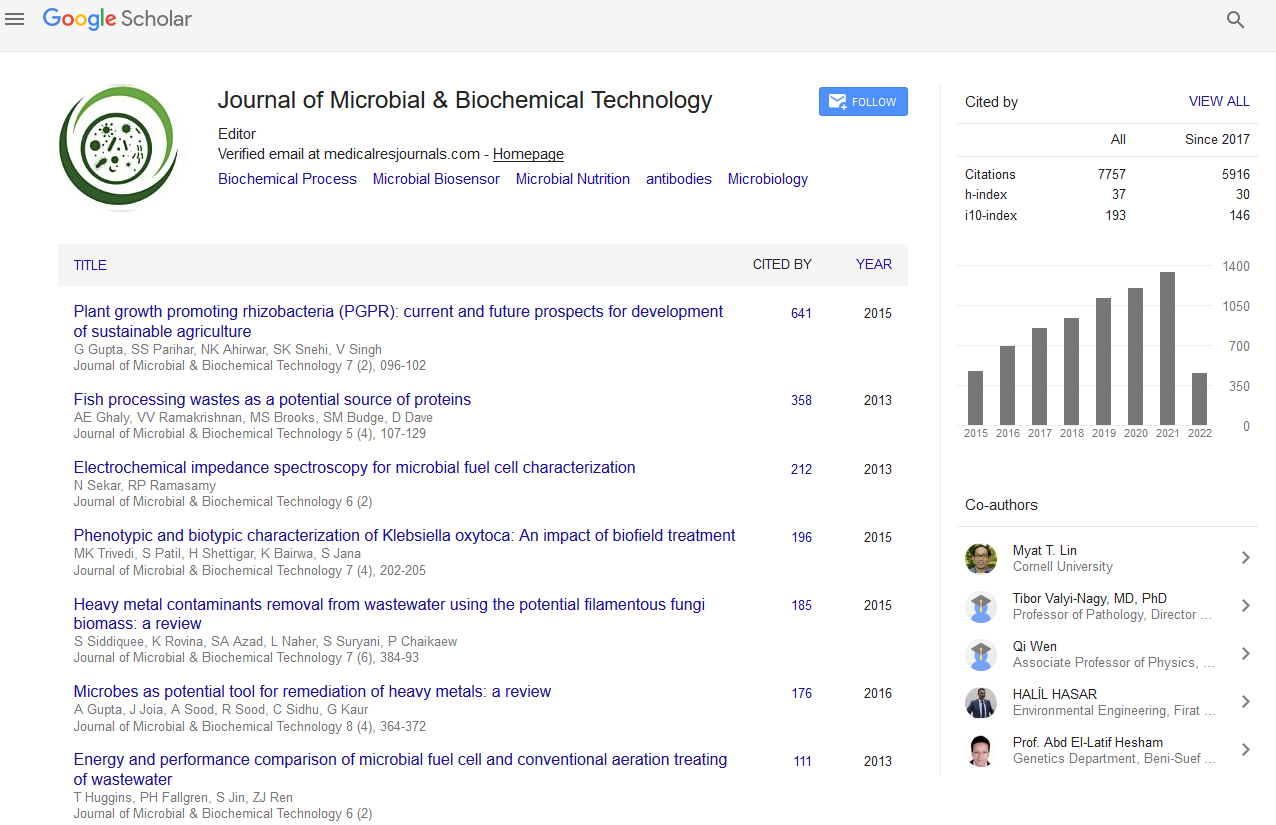PMC/PubMed Indexed Articles
Indexed In
- Academic Journals Database
- Genamics JournalSeek
- Academic Keys
- JournalTOCs
- China National Knowledge Infrastructure (CNKI)
- Scimago
- Access to Global Online Research in Agriculture (AGORA)
- Electronic Journals Library
- RefSeek
- Directory of Research Journal Indexing (DRJI)
- Hamdard University
- EBSCO A-Z
- OCLC- WorldCat
- SWB online catalog
- Virtual Library of Biology (vifabio)
- Publons
- MIAR
- University Grants Commission
- Geneva Foundation for Medical Education and Research
- Euro Pub
- Google Scholar
Useful Links
Share This Page
Journal Flyer

Open Access Journals
- Agri and Aquaculture
- Biochemistry
- Bioinformatics & Systems Biology
- Business & Management
- Chemistry
- Clinical Sciences
- Engineering
- Food & Nutrition
- General Science
- Genetics & Molecular Biology
- Immunology & Microbiology
- Medical Sciences
- Neuroscience & Psychology
- Nursing & Health Care
- Pharmaceutical Sciences
Isolation, characterization and genome analysis of Paenibacillus polymyxa CR1, a bacterium for biocontrol, biomass degradation, biofuel and chemical production
World Congress and Expo on Applied Microbiology
August 18-20, 2015 Frankfurt, Germany
Ze-Chun Yuan
University of Western Ontario, Canada
Scientific Tracks Abstracts: J Microb Biochem Technol
Abstract:
Non-food biomass holds great promise as sources of clean and renewable fuels and chemicals. However, lignin depolymerization is the bottleneck for lignocellulosic biofuels and chemicals. Understanding the bacterial metabolic pathways and regulatory mechanisms underpinning lignin degradation is very important for developing cost effective techniques to revitalize the biorefinery industry. We recently isolated and characterized Paenibacillus polymyxa CR1 (Corn Rhizobacetrium) exhibited multifaceted plant-beneficial traits including phytohormone (indole-3-acetic acid) production, nitrogen fixation, and antagonistic activities against crop pathogens. P. polymyxa CR1 significantly promotes the growth of corn, potato, cucumber, tomato and Arabidopsis thaliana. P. polymyxa CR1 also demonstrated strong ability in degrading and utilizing lignin, cellulose and hemi-cellulose as sole source of carbon and produce valuable chemicals and fuels. In addition, P. polymyxa CR1 degrades saw dust directly and produces phenylacetic acid (also called benzeneacetic acid) which is widely used in perfumes, penicillin G production and other purposes. To facilitate understanding its metabolic pathways implicated in biomass degradation and bioproduction, we sequenced the complete genome of P. polymyxa CR1 (~6Mbs). We also compared the P. polymyxa CR1 genome with the other 3 P. polymyxa genomes fully sequenced. Our genomics and comparative genomics analysis revealed many conserved genes/functions relevant to antimicrobial production, biomass degradation and bioproduction, which lays a solid foundation for our future work, e.g., using genetic and metabolic engineering to rewire bacterial metabolic flux networks and synthetic pathways for efficient conversion of lignocellulosic biomass (forestry and agricultural residues, municipal biosolids and wastes of paper industry) into value-added biofuels and chemicals.
Biography :
Ze-Chun Yuan has completed his PhD from McMaster University in Canada and Postdoctoral studies from University of Washington (Seattle, USA). He is a research professor at University of Western Ontario (Canada), and a Principal Investigator (research scientist) at Agriculture and Agri-Food Canada (London, Ontario). He has published several interesting papers in reputed journals and is serving as routine reviewers for many important scientific journals.


